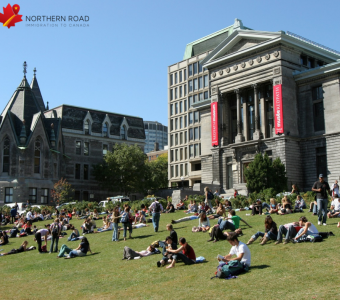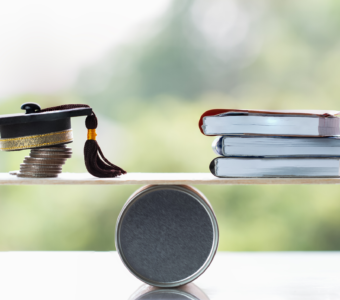
Author: Nolan Clack -Guest blogger
You have researched which country you wish to study, applied for a school in Canada, received your acceptance letter from your institution, and are now preparing for your last slight stretch before embarking on a new journey to study abroad in Canada!
As Canadians living here in Vietnam, we can’t be any more excited for you to experience our country and culture. Vietnam and its people have graciously opened up their arms for us to live and share your culture; therefore, we want to be the first to welcome you and prepare you for your study abroad program in Canada.
Firstly, if you have not secured your Canadian student visa but have your institution acceptance letter, the first thing you should prepare is your student visa. Then, take our free self-assessment to determine if you’re ready to apply for your Canadian student visa.
Preparing to Study Abroad in Canada
Unlike packing for a beach vacation, packing to study abroad in Canada isn’t as straightforward as packing sunglasses, sunscreen, a swimsuit, and a pair of sandals. On the contrary, studying in Canada can come with difficulty given the four seasons throughout the year.
You might be asking yourself questions like, how cold does it get in Canada? How many clothes are too many clothes? What if I bring too few clothes? What should I not bring with me? Am I packing too much?
Although it might seem like a daunting task, packing to study in Canada is easier than you might think. As Canadians who have experienced every Canadian climate you can imagine, you’ve found the right place to get the inside scoop for what you need to prepare to study abroad in Canada.

What to Pack to Study Abroad in Canada: The Essentials
Starting on the list, we should jump into the things you definitely won’t want to forget. In the essentials list below, be sure that you pack these in your carry-on bag and not your suitcase. We wouldn’t want your dreams to study in Canada to start as a nightmare should your luggage go missing!
Your essentials should include:
Passport & Canadian Student Visa
Tuck your passport away, and be sure to have it close by your side. We highly suggest you have scanned photocopies of your passport and Canadian student visa in a separate place from your original passport. Should your passport be lost or stolen, photocopying these documents beforehand will make it much easier to replace, if ever required. We hope you won’t ever have to!
From this entire list, your passport is the most important thing while studying abroad in Canada, and be sure to always keep it in a safe place. Misplacing a passport abroad can quickly make your study in Canada a not-so-fun experience.
Letter of Entry & School Acceptance to Canada
Along with your passport, be sure to bring a copy of your letter of entry to Canada and your letter of acceptance that your school would have provided you to apply for your Canadian student visa. Upon your arrival in Canada, Canada Border Service Officers are likely to be asked for these documents before issuing your study permit. So, like your passport, have these easily accessible to present upon arrival.
Flight Tickets
Not a great way to start your study abroad program in Canada when you realize you forgot your flight tickets after you have reached the airport! Be sure to have saved your flight confirmation number somewhere that is easy to access to make your journey to Canada one less thing to provide stress.
Canadian Currency
While you likely will have a Canadian credit or debit card set up before your departure, it’s a good idea to bring either some Canadian currency or USD in hand just in case. Having cash on hand can help if your bank card is cancelled while trying to make purchases abroad. In addition, your bank may block your card payment from going through for fraud prevention if a purchase is made abroad, which is never a fun experience! Finally, a rule of thumb, do not to bring Vietnamese Dong into Canada. Doing so will be a challenge to exchange Vietnamese Dong at a Canadian bank.
Suppose you haven’t set up a Canadian bank account before your departure and are using your bank account registered in Vietnam. Although we highly suggest you do. In the case you have not, It’s best to inform your financial provider you are studying in Canada to avoid the bank blocking card payments when they see a payment is trying to be made in a foreign country.
Health Insurance
If you have already applied for your Canadian student visa, ensure you grab all the necessary documents needed or save them digitally. If you don’t already have health insurance, you will need to apply for it before your departure. As an international student, you are required to secure private health insurance for the duration of your studies in Canada. International students have two options to secure health insurance:
- Acquire private health insurance from an insurance company
- Register for health insurance through your educational institution
If you wish to obtain private health insurance, there are resources available to explore health insurance options within Canada.
Prescription Medications
If you require to bring prescription medications with you, you will only be allowed to bring upwards to 90 days worth of personal prescription medication. Bringing health products into Canada for personal use has its own set of rules and regulations. It should be researched well in advance before your departure to ensure you abide by Canadian compliances. Additionally, when studying abroad in Canada, having a copy of a medical report explaining your health condition, in either English or French, to present to a Canadian doctor is a good idea if you need to renew your prescription medication.
Clothes to Pack to Study Abroad in Canada
We know what you’re thinking. Canada is cold during the winter months; therefore, make sure I pack lots of warm clothes! While warm clothes are essential, it’s also important to consider how much weight your baggage check-in allows.
Cramming heavy layers of clothes can quickly increase your baggage weight and not leave room for other items you will want and need. Balance is key here, and it is tricky to decide what to bring if you have never experienced Canada’s cooler weather.
Therefore, to make things easier for you, let us break down the best way to pack clothes for your studying abroad in Canada.
Fall and Winter Months Studying Abroad in Canada
Counterintuitive to what you might think, lighter clothes with layers will keep you warmer during the fall and winters months. Fall typically starts in September and can expect to transition to winter months by the first week of November.
If you start your studies in Canada during the fall, you should prepare longer in length clothes. Fall is when the leaves on the trees begin to turn yellow, orange, and red due to the changing weather and colder nights. Wearing jeans, pants, and a long-sleeve shirt with a windbreaker jacket will be sufficient to get around comfortably.

In November, when the snow begins to fall, which can last as late as April, investing in a good winter jacket will make a world of difference for comfort. But, much like the fall months, wearing multiple layers of clothes with jeans or pants is still a great option.
Prepare for your journey to study abroad in Canada during the winter months by bringing multiple pairs of pants, four or five of your favorite long-sleeve shirts, two hoodies or a sweatshirt, and two weeks’ worth of underwear and socks.
If you plan to start your studies in Canada during the winter months, we suggest purchasing a light winter hat and gloves and placing them in your carry-on; that way, once you arrive, you can put them on before leaving the airport without rummaging through your luggage.
Once you are in Canada, many stores sell comfortable winter jackets. As an international student, be sure to take advantage of the outstanding student discounts available when purchasing winter gear like a winter jacket. To read more about students discounts, read our blog on 10 money-saving tips for international students studying in Canada.
Spring and Summer Months Studying Abroad in Canada
Although Canada has some frosty and nippy winters, Canadian spring and summer months warm up considerably, and lighter clothes will only be required.
Canadian spring usually starts in April and goes till June. Students studying in Canada generally can wear jeans, pants, a t-shirt, and a light wind jacket during these months. If it is your first Canadian spring, it will still be considered cooler weather if coming from Vietnam. Our best suggestion if you arrive and are studying in Canada during the spring is to think and pack as if you were visiting Dalat.

If you are coming to Canada during the summer months, which lasts between June and August, the weather can go upwards to 40*C. Depending on the province and city, we suggest packing two pairs of sandals, a pair of running or walking shoes, four pairs of shorts, three t-shirts, two short sleeves shirts, a bathing suit, and for women packing three summer dresses.
What Not to Pack to Study Abroad in Canada
Jewelry
Although it might be tempting to bring expensive items like jewelry should be avoided. If you are considering bringing jewelry, bring one or two of your favourites. If you pack too many, you risk the chance of them getting broken or stolen.
Books
We know you are eager to study in Canada; however, it is probably best to avoid bringing books because chances are, you will read them once, and they contribute to quite a bit of unnecessary weight in your luggage.
Heavy Liquids
To avoid issues at international security at the airport, do not carry any large bottles that have liquids in them. You will be asked to dispose of them going through security. If you need to bring bottles such as hand sanitizer, purchase small travel pack sizes that are permitted and won’t cause any problems at international security.
Food
One of the most important ones on the list is to not pack food in your luggage when going to Canada. Unlike surrounding Southeast Asian countries, Canada does not allow certain types of food, such as vegetables, fruits, animal, or fish products. Therefore, should you require food or snacks during your travels, it is best to purchase foods available after international security in the airport or airlines food till you arrive in Canada.
Are you still unsure about studying in Canada? Perhaps you wonder about the cost of studying in Canada or if you need help understanding the conditions to study in Canada?
Make Phan Immigration your Canadian study abroad consultant partner, and let us help you ignite your dreams of studying abroad in Canada!








